 Time Time |
Tuesday 09 December
TRANSPORT |
| |
|
| 13:00-13:15

webcast

presentation
 + +
integrated webcast
|
Opening Remarks
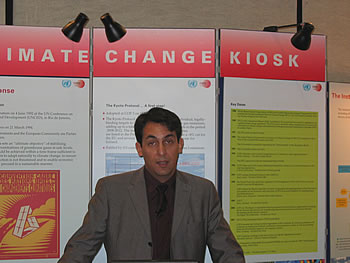
Harald Diaz-Bone
Climate Change Secretariat (UNFCCC)
|
| |
|
| 13:15-13:30 
webcast

presentation
 + +
integrated webcast
|
The case for a global greenhouse gas standard for vehicles based on
the California model
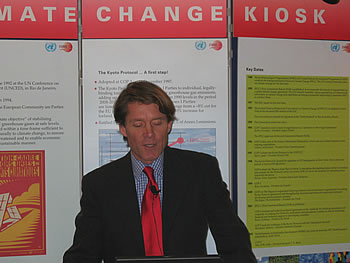
Russell Long, Executive Director
Bluewater Network
The development of global fuel mileage or greenhouse gas standards for vehicles
would substantially reduce greenhouse gas emissions, regardless of the outcomes
of Kyoto. Dr. Russell Long, who conceived and authored the recent law to control
greenhouse gas emissions in California, the first such law in the United States,
will present the case for establishing such standards. |
| |
|
| 13:30-13:45 
webcast

presentation
 + +
integrated webcast
|
Aviation and climate change

Karsten Krause, Policy Officer
European Federation for Transport and Environment
Air transport is one of the fastest growing sources of greenhouse gas emissions.
The impact of climate change has been estimated as 3,5 percent of the emissions
in 1992. These are twice the emissions of a country like France or Australia.
The aviation emissions will grow until 2050 between factor 2,6 and factor 11.
Currently there are no emission reduction objectives that could reduce the forecasted
growth. The presentation will be covering the impact on climate change and ways
towards a more sustainable aviation. Important for any progress is depending
on the interaction between the UNFCCC, the ICAO(International Civil Aviation
Organisation) and, in particular the European Union. The presentation will highlight
the need for further action.
|
| |
|
| 13:45-14:00 
webcast

presentation
 + +
integrated webcast
|
Lufthansa German Airlines - Our commitment in reducing climate impact
and supporting climate research
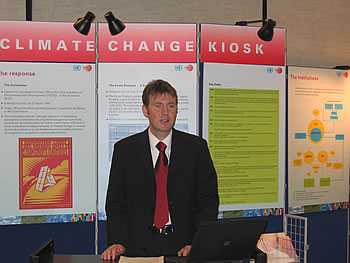
Andreas Waibel
Deutche Lufthansa AG
A presentation which outlines Lufthansa's climate concerns. Our strategic
is twofold, first to continuously minimize environmental impact and, second to
take activ part in climate research. In this talk we show our environmental performance
as well as our activities in climate research within the last 10 years.
|
| |
|
| 14:00-14:15 
webcast

presentation
 + +
integrated webcast
|
Urban transport networks of the future
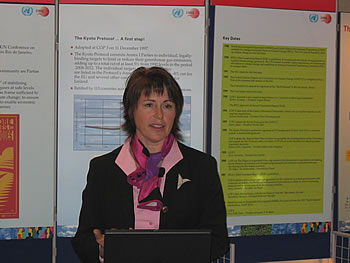
Heather Allen, Issue Management, Secretary General's Department
International Association of Public Transport (UITP)
|
|
|
| 14:15-14:30

webcast

presentation
 + +
integrated webcast
|
Innovative ways to achieve urban mobility carbon reduction
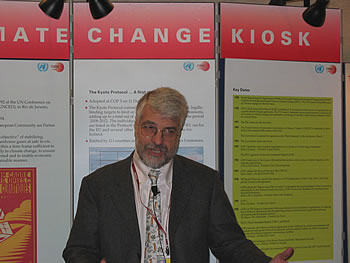
Gianni Silvestrini, Scientific Director
Kyoto Club
Transport carbon emissions have increased in most countries (20% between 1990
and 2000 in Italy). A particular attention should therefore be given in this
area, with a sophisticated approach that considers both technology innovation
and mobility demand management. The more interesting and successful Italian experiences
will be presented, from the "car free sundays" to the diffusion of
gas vehicles.
|
|
|
| 14:30-14:45

webcast

presentation
 + +
integrated webcast
|
Keep Kyoto on track: Transport and climate change at the crossroads…
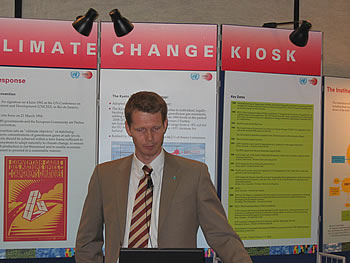
Mads Bergendorff, Senior Environmental Adviser
International Union of Railways
20% of global CO2 emissions come from transport alone. Used as backbone of
sustainable transport systems globally and supported by appropriate measures
to facilitate the needed modal shift, the CO2 advantage of railways and public
transport alone offer a way to achieve the Kyoto Protocol aims. |
|
|
| 14:45-15:00

webcast

presentation
 + +
integrated webcast
|
The clean development mechanism: A new tool for sustainable transportation?
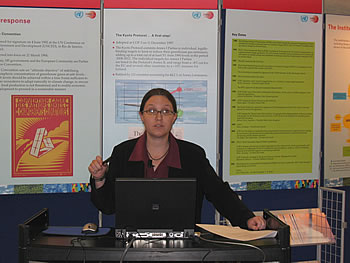
Jodi Browne, Project Manager, Climate Change and Energy
Institute for Sustainable Development (IISD)
In Chile, as in other developing countries, the transportation sector is the
largest source of energy-related carbon dioxide (CO2) emissions. Transport accounts
for upwards of 25% of human-induced greenhouse gases in many countries; given
current motorization trends emissions this could increase by a factor of four
by 2020 without mitigative measures. The Clean Development Mechanism (CDM) represents
a crucial opportunity to develop a sustainable transportation sector for developing
countries that can also increase funding flows, enhance capacity and expand technology
transfer opportunities. By providing credits for projects undertaken in developing
countries, the CDM acts as an incentive for emissions reductions while also stimulating
much-needed investment in sustainable development. The discussion will focus
on the role of transportation in Chile's emission profile, and the potential
role of the CDM as a contributor to sustainable transportation.
|

![]()